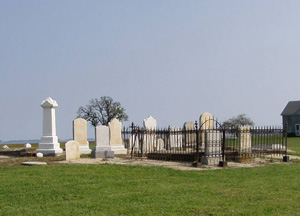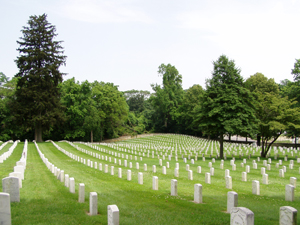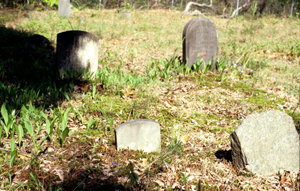 View of a historic cemetery on Hooper’s Island, Dorchester County
View of a historic cemetery on Hooper’s Island, Dorchester County
Cemeteries and burial grounds are complex cultural landscapes. They hold information about our social,
cultural, artistic and architectural heritage. They often are hidden away and undiscovered in woodlands
or farm fields. Some graves may never have been marked, or may have lost their markers, or may be marked with
field stones; while more difficult to recognize, they are equally worthy of protection. Pre-Contact Native
American prehistoric burial sites are commonly unmarked and may include the remains of one or hundreds of
individuals. When burial grounds are located and recorded with county governments, they can be protected and
taken into consideration during planning activities.
Legal Protection for Cemeteries and Burial Grounds
Ground Disturbance, Disinterment, and Accidental Discovery
Maryland law provides protection against disturbance of burial sites and human remains and provides a basis
for access. Should human remains be discovered accidentally, the law requires notification of your county State's
Attorney.
Burials of Indigenous Americans, enslaved people, and others may be unmarked, including graves that may
lie outside the boundaries of known cemeteries; modern boundaries often fail to enclose an entire historic
cemetery. Markers also may have fallen and become buried below grade. Probing to identify unmarked graves
may result in damage and is discouraged unless conducted with the landowner's permission by an archaeologist
trained in techniques for locating graves. Some cultural resource consultants offer the service of delineating
graveyards.
No ground-disturbing activities may be conducted on state-owned or state-controlled property without
obtaining a permit from MHT.
» Maryland
Burial Law
» Archaeology Permits
Required Consultation with MHT
During the 2018 Maryland Legislative Session, the following addition was made to the Real Property article of
Maryland Code:
§ 14-121.1. Proper treatment
of burial site in existence for more than 50 years
(a) "Burial site" defined. -- In this section, "burial site" has the meaning
stated in § 14-121 of this subtitle.
(b) Owner to consult with the Director of Maryland Historical Trust. -- An owner
of a burial site or of the land encompassing a burial site that has been in existence for more than 50 years
and in which the majority of the persons interred in the burial site have been interred for more than 50 years
shall consult with the Director of the Maryland Historical Trust about the proper treatment of markers, human
remains, and the environment surrounding the burial site.
(c) Advice is not binding. -- Advice provided by the Maryland Historical Trust
under this section is not binding on the owner of the burial site.
Section 14-121, to which this provision refers, defines "burial site" as "any natural or prepared physical
location, whether originally located below, on, or above the surface of the earth into which human remains or
associated funerary objects are deposited as a part of a death rite or ceremony of any culture, religion, or
group." Under these provisions, the owner of a covered burial site is required to consult with MHT before
altering one or more of the following: (1) grave markers, (2) human remains, or (3) the environment surrounding
the burial site.
If you are the owner of a burial site or of the land encompassing a burial site and you plan on carrying out any
of the work outlined above, please complete and submit the following form in order to initiate consultation
with MHT.
» ADVICE FOR OWNERS FORM
If you are not the owner of a burial site or of the land encompassing a burial site, but plan on conducting
activities that will impact the grave markers, human remains, or surrounding environment of the burial site,
please complete and submit the following form so that MHT may provide advice regarding cemetery preservation
best practices.
» ADVICE FOR NON-OWNERS FORM
To Report a Historic Cemetery
If you wish to report a historic cemetery, you can add it to a database being developed by the
Baltimore County Genealogical Society. For details, click the link below.
» Baltimore
County Genealogical Society Burial Project
Modern and Recent Cemeteries
For information on starting a new cemetery or regulating an existing cemetery, please
contact the State
of Maryland Office of Cemetery Oversight, in the Department of Labor, Licensing and Regulation (DLLR).
Inventories
Documentation of historic cemeteries and burial sites is a crucial step in their protection and
management. Currently, MHT does not have a dedicated cemetery inventory. However, cemeteries and burial
sites may be included in the Maryland Inventory of Historic
Properties (MIHP). Many cemeteries and
burial sites are included as resources within the boundaries of other historic properties, such as
churches, farms and historic districts. Some cemeteries are recorded in the MHT archaeology site files,
although these are files not available to the public in order to protect often sensitive archaeological
resources from disturbance. The MIHP is a research and documentation instrument. Listing of a cemetery in the
MIHP has no regulatory impact on that resource and does not convey a historic designation.
Efforts to inventory and provide for protection of cemeteries through local ordinances vary widely by
jurisdiction. If you are concerned about a cemetery or burial site, MHT suggests you provide your
local planning and zoning office with the resource’s location to ensure it is recorded for planning
and permitting purposes. A list of local planning and zoning offices can be found on the
Maryland
Department of Planning web site. Some jurisdictions have adopted local historic area zoning
ordinances, which in some cases may be used to provide certain protection for
cemeteries.
Local jurisdictions may have laws and regulations dealing with cemeteries as well. Click the link below to
see the laws and regulations that may also apply to the area of interest.
» Cemetery Laws by County or Jurisdiction
Design Guidelines and Alterations
Jurisdictions that designate historic cemeteries under a local historic preservation ordinance may
wish to adopt guidelines to help direct local review of proposed alterations to designated historic
cemeteries. Design guidelines outline the types of undertakings that may be appropriate or inappropriate
for historic resources. In the case of cemeteries, they might establish certain types of activities, such
as active burials and maintenance, that do not require review.
Prior to starting maintenance or making any changes to a historic cemetery, MHT recommends contacting your local
planning office or local historic preservation commission.
National Register Designation
Ordinarily cemeteries are not considered eligible for listing in the
National Register of Historic Places, the nation's
list of cultural resources maintained by the National Park Service. National Register designation may
qualify a cemetery for financial incentives and provides an opportunity for consultation if a state
or federal action may impact the site. For more information, see the MHT
Project Review page.
 View of Annapolis National Cemetery
View of Annapolis National Cemetery
Note that some cemeteries are found on the grounds of National Register-listed historic districts or
invidually listed buildings, such as churches. Cemeteries may qualify for the National Register
if they are integral parts of such properties or districts that meet the criteria for listing. As some
cemeteries may embody values beyond the personal, family-specific, or religious, the National
Register criteria do allow for the listing of individual cemeteries and burial grounds under certain
limited conditions. A cemetery may be eligible if it derives its primary significance from:
- graves of persons of transcendent importance,
- the age of the burials,
- distinctive design features,
- association with historic events, or
- if the resource has the potential to yield important information.
»
NPS
Preservation Brief #48, Preserving Grave Markers in Historic Cemeteries
 View of the Hopkins Cemetery – Anne Arundel County
View of the Hopkins Cemetery – Anne Arundel County
Funding and Technical Assistance
MHT can provide technical assistance on historic cemetery matters. However, MHT does not have dedicated funding
for cemetery preservation projects. Historic Preservation Capital grants
are available to eligible applicants (usually non-profit organizations and local jurisdictions) for
projects including acquisition, rehabilitation and restoration of historic property included in or
eligible for the National Register. Note, the grantee must donate a preservation easement on the property
to MHT in order to receive a Historic Preservation Capital grant. Because cemeteries often have multiple
lot owners, the conveyance of an easement on cemeteries is often complicated.
The Maryland Heritage Areas Program, administered by MHT,
may provide funds for cemetery projects that fall within the boundaries of one of Maryland's thirteen
heritage areas. Please note that the project must have a Heritage tourism component and support the
management plan of the local heritage area.
Cemeteries and burial grounds that are significant to the African American experience in Maryland may be
eligible for funding from the African American Heritage
Preservation Program.
Archaeological remote sensing surveys funded with State monies must collect and record data in a scientific
manner which allows results to be analyzed, reported, and potentially ground-truthed or reproduced.
See the document below for further guidance.
» MHT Guidance
for Ground Penetrating Radar Surveys in Cemeteries
Training Opportunities
The Coalition to Protect Maryland Burial Sites hosts an annual conference, networking
opportunities, and training sessions throughout the year.
The National Center for Preservation Technology and Training
offers workshops and courses; the website also has training videos.
The Association for Gravestone Studies
offers conservation workshops at their annual conferences.
The National Preservation Institute
offers cemetery and cemetery landscape preservation seminars.
The Association for Preservation Technology International
(APT) offers cemetery preservation sessions at annual conferences.
For Further Help
For questions related to cemetery technical assistance, maintenance, and conservation consultation, or
questions related to cemetery delineation through remote sensing or archaeology, please contact Dr.
Zachary Singer at zachary.singer@maryland.gov.